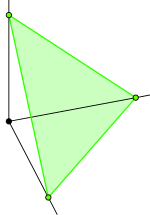In geometry, a uniform polyteron is a 5-dimensional polytope which is vertex-transitive, and whose hypercells are uniform polychora.
Convex uniform polytera
editIn 5 dimensions and higher, the only regular polytopes are the n-simplex, the n-cross polytope, and the n-hypercube. The hexateron (5-simplex) gives rise to the hexateric family of uniform polytera, while the pentacross (5-cross) and penteract (5-cube) give rise to the penteractic family of uniform polytera.
In addition, there is the family of demihypercubes which in 5D and above is distinct from the hypercube family of uniform polytopes. In 5D, this is the demipenteractic family.
Finally, there are the infinite families of prisms, derived from the prisms and duoprisms of the previous dimensions.
The penteractic family
editThe penteractic family of polytera are given by the convex hulls of the base points listed in the following table, with all permutations of coordinates and sign taken. Each base point generates a distinct uniform polyteron. All coordinates correspond with uniform polytera of edge length 2.
Simplex coordinates
edit

I found a useful extension - the n-simplex truncation coordinates can be found as facets of the (n+1)-orthoplexes in (n+1)-space. There's one "simplex truncation" facet in each coordinate orthant (just ignore the sign combinations) from each above polytopes with the end-node with the 4 edge unringed. Tom Ruen (talk) 02:43, 28 July 2010 (UTC)
| # | Base point | Name | Coxeter-Dynkin | Vertices |
|---|---|---|---|---|
| 1 | (0, 0, 1) | Triangle |    | 3 |
| 2 | (0, 1, 1) | Rectified triangle |    | 3 |
| 3 | (0, 1, 2) | Truncated triangle |    | 6 |
| # | Base point | Name | Coxeter-Dynkin | Vertices |
|---|---|---|---|---|
| 1 | (0, 0, 0, 1) | tetrahedron |      | 4 |
| 2 | (0, 0, 1, 1) | Rectified tetrahedron |      | 6 |
| 3 | (0, 0, 1, 2) | Truncated tetrahedron |      | 12 |
| 4 | (0, 1, 1, 1) | Birectified tetrahedron |      | 4 |
| 5 | (0, 1, 1, 2) | Cantellated tetrahedron |      | 12 |
| 6 | (0, 1, 2, 2) | Bitruncated tetrahedron |      | 12 |
| 7 | (0, 1, 2, 3) | Omnitruncated tetrahedron |      | 24 |
| # | Base point | Name | Coxeter-Dynkin | Vertices |
|---|---|---|---|---|
| 1 | (0, 0, 0, 0, 1) | Pentachoron |        | 5 |
| 2 | (0, 0, 0, 1, 1) | Rectified pentachoron |        | 10 |
| 3 | (0, 0, 0, 1, 2) | Truncated pentachoron |        | 20 |
| 4 | (0, 0, 1, 1, 1) | Birectified pentachoron |        | 10 |
| 5 | (0, 0, 1, 1, 2) | Cantellated pentachoron |        | 30 |
| 6 | (0, 0, 1, 2, 2) | Bitruncated pentachoron |        | 30 |
| 7 | (0, 0, 1, 2, 3) | Cantitruncated pentachoron |        | 60 |
| 8 | (0, 1, 1, 1, 1) | Trirectified pentachoron |        | 5 |
| 9 | (0, 1, 1, 1, 2) | Runcinated pentachoron |        | 20 |
| 10 | (0, 1, 1, 2, 2) | Bicantellated pentachoron |        | 30 |
| 11 | (0, 1, 1, 2, 3) | Runcitruncated pentachoron |        | 60 |
| 12 | (0, 1, 2, 2, 2) | Tritruncated pentachoron |        | 20 |
| 13 | (0, 1, 2, 2, 3) | Runcicantitruncated pentachoron |        | 60 |
| 14 | (0, 1, 2, 3, 3) | Bicantitruncated pentachoron |        | 60 |
| 15 | (0, 1, 2, 3, 4) | Omnitruncated pentachoron |        | 120 |































